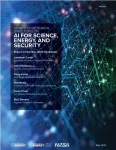(Press-News.org) Online, profile pictures of human faces are everywhere, and they play a crucial role in shaping the first impression we make on others. Right now, AI gives people the digital tools to transform their online appearance in any way they desire, often making themselves look younger or more attractive. But this is just the beginning: AI is not only helping us play this face game amongst ourselves, but it is also learning the game from us and quietly deciding which face it will showcase as itself when interacting with us.
To better understand these mechanisms, researchers from the Max Planck Institute for Human Development, the Toulouse School of Economics, the University of Exeter, and the University of British Columbia, together with the Universidad Autonoma de Madrid and Université Paris Cité, have created and launched The Face Game. In this online experiment, humans mix up with neural networks, and everyone (including the machines), posts their own profile pictures and reacts to the profile pictures of others. The game aims at understanding how AI will learn to choose different types of faces for itself, depending on the impression it wants to make and the human it interacts with.
“As we increasingly come across AI replicants with self-generated faces, we need to understand what they learn from observing us play the face game and ensure that we retain control over how we interact with these digital entities,” says Iyad Rahwan, Director at the Center for Humans and Machines at the Max Planck Institute for Human Development. His research center explores ethical questions concerning AI and the concept of Machine Behavior.
This project comes from the research team that developed the Moral Machine, a massive online experiment that went viral in 2016. It explored the ethical dilemmas faced by autonomous vehicles, highlighting universal principles as well as cross-cultural differences in how people want AI to behave. The results were published in leading journals, including Science and Nature.
Developed by Universidad Autonoma de Madrid researchers, The Face Game operates on multimodal AI methods, including human behavior analysis with discrimination-aware machine learning and realistic synthetic face images.
Further reading:
„Machines are becoming ever more sophisticated in how they interact with us“.
An interview with Iyad Rahwan, Jean-Francois Bonnefon, and Aythami Morales Moreno: https://www.mpib-berlin.mpg.de/press-releases/the-face-game-interview
The Face Game – How it works
Once participants have logged in, they can begin playing rounds of the game, wherein they must mark the profile pictures of other players as “team”-looking or “solo”-looking. They get immediate feedback about the accuracy of their predictions.
Moreover, once they upload their profile pictures, participants get regularly updated statistics about how other players have reacted to them. They can experiment with different profile pictures to see which are rated more “team”- or more “solo”- looking. Finally, participants will encounter “replicants,” nonhuman players whose faces have been generated by state-of-the-art AI models continuously monitoring how human participants play the game. Everyone can take part as long as they are able to give consent. https://the-face-game.net/
Involved institutions:
Max Planck Institute for Human Development
The Max Planck Institute for Human Development in Berlin was founded in 1963. It is an interdisciplinary research institution dedicated to studying human development and education. The Institute belongs to the Max Planck Society for the Advancement of Science, one of the leading organizations for basic research in Europe.
Researchers involved in The Face Game: Prof. Iyad Rahwan, Dr. Nils Köbis, Amee Assad
Toulouse School of Economics (TSE)
The Toulouse School of Economics is a world-renowned center for research and education, hosting more than 150 international faculty, including a 2014 Nobel laureate. It is one of the top 10 economics departments worldwide, and its mission is to leverage “Economics for the Common Good”.
Researcher involved in The Face Game: Prof. Jean-Francois Bonnefon
University of Exeter
The University of Exeter is a Russell Group university that combines world-class research with high levels of student satisfaction. Exeter has over 30,000 students and sits within the Top 15 universities in The Guardian University Guide 2023 and in the top 150 globally in both the QS World Rankings 2022 and THE World University Rankings 2023.
Researcher involved in The Face Game: Dr. Edmond Awad
University of British Columbia
The University of British Columbia is a global centre for teaching, learning and research, consistently ranked in the top three universities in Canada, and among the top 20 public universities in the world. Researcher involved in The Face Game: Prof. Azim Shariff
Universidad Autonoma de Madrid
The Universidad Autonoma de Madrid is a leading research and education institution in Spain well connected to the main AI research networks and initiatives in Europe like ELLIS (through the ELLIS Unit Madrid). For a long time, UAM has been distinguished for its contributions to biometrics research and applied AI.
Researchers involved in The Face Game: MSc. Ignacio Serna, Prof. Julian Fierrez, Assoc. Prof. Aythami Morales.
Université Paris Cité
The LaPsyDE lab at the Université Paris Cité and The French National Centre for Scientific Research (CNRS) is a leading center for the study of human thinking and its development.
Researcher involved in The Face Game: Prof. Wim De Neys
END
The Face Game: A citizen science project to learn how Artificial Intelligence will choose to appear to humans
New project by the creators of the Moral Machine experiment
2023-06-12
ELSE PRESS RELEASES FROM THIS DATE:
Ethics & Human Research, May-June 2023
2023-06-12
Making an Advance Research Directive: An Interview Study with Adults Aged 55 and Older with Interests in Dementia Research
Nola M. Ries, Briony Johnston
Many people with dementia are interested in taking part in research, including when they no longer have capacity to provide informed consent. Advance research directives (ARD) enable people to document their wishes about research participation prior to becoming decisionally incapacitated. However, there are few available ARD resources. This Australian interview study elicited the views of people aged 55 years and older about the content of an ...
Visionary report unveils ambitious roadmap to harness the power of AI in scientific discovery
2023-06-12
Innovations in artificial intelligence (AI) are rapidly shaping our world, from virtual assistants and chatbots to self-driving cars and automated manufacturing. Seizing on the potential of AI to transform science, the nation’s leading experts in science and technology have released a blueprint for the United States to accelerate progress by expanding its capabilities in AI and big data analysis.
“AI for Science, Energy, and Security” lays out a comprehensive vision ...
Masai giraffes more endangered than previously thought
2023-06-12
UNIVERSITY PARK, Pa. — Giraffes in eastern Africa may be even more endangered than previously thought. A new study led by researchers at Penn State reveals that populations of Masai giraffes separated geographically by the Great Rift Valley have not interbred — or exchanged genetic material — in more than a thousand years, and in some cases hundreds of thousands of years. The researchers recommend that the two populations be considered separately for conservation purposes, with separate but coordinated conservation efforts to manage each population.
Populations of giraffes have declined rapidly in the last thirty years, with ...
WVU research shows how much pharmaceutical companies are capitalizing on rare drug incentives
2023-06-12
Drugs used to treat rare conditions are earning pharmaceutical companies almost as much as those marketed to the general public, according to a researcher at West Virginia University. Sean Tu, a College of Law professor found lucrative so-called “orphan” drugs earn manufacturing tax credits, have longer patent exclusivities and face easier Food and Drug Administration review.
Orphan drugs treat diseases that affect fewer than 200,000 Americans. In addition to tax credits, Congress has incentivized the pharmaceutical companies that manufacture orphan drugs with a waiver of ...
Planet orbiting 2 stars discovered using new technique
2023-06-12
COLUMBUS, Ohio – An international team of astronomers is the first to apply an old technique to discover a new type of planet that orbits two stars – what is known as a circumbinary planet.
As an added bonus, researchers found a second planet that is orbiting the same two stars, which is only the second confirmed multi-planet circumbinary system found to date. The study was published today in the journal Nature Astronomy.
Circumbinary planets were once relegated to only science fiction, but thanks to data collected from NASA’s Kepler mission, astronomers now know that multiple star systems are ...
Railways could be a key 'utility player' for backup power
2023-06-12
– By Christina Nunez
The U.S. electric grid faces simultaneous, evolving pressures. Demand for power from the grid is increasing as people adopt electric cars and building energy is transitioned from gas to electricity. At the same time, climate change is driving more extreme weather. Events like the 2020 heat wave that led to rolling blackouts in California are relatively infrequent, but they are happening more often – and utilities need to be ready for them.
New research points to a flexible, cost-effective option for backup power when trouble strikes: batteries aboard trains. A study from the U.S. Department of Energy’s Lawrence Berkeley National Laboratory ...
Hines studying male victims of intimate partner violence in racial/ethnic minority communities
2023-06-12
Denise Hines, Associate Professor, Social Work, received funding for the study: "Understanding Male Intimate Partner Violence Victims from Racial/Ethnic Minority Communities."
Hines will lead a four-phase study on the experiences of male victims of intimate partner violence, with a specific focus on men from racial/ethnic minority communities.
She will conduct the study in four, simultaneous phases.
In Phase 1, Hines will conduct a survey study of male Intimate Partner Violence (IPV) victims, including 300 White men, 300 Black men, and 600 Latino men from both immigrant and non-immigrant communities within the United States. The survey will ...
Becker receives funding for scientific support in solar physics
2023-06-12
Peter Becker, Professor of Astrophysics and Space Sciences, received funding for: "Scientific Support in Solar Physics, Remote Sensing, Space Weather, High-Energy Astrophysics, and Associated Scientific Fields."
As part of this project, Mason researchers will conduct research in collaboration with the Naval Research Laboratory (NRL).
Areas covered by this research include: space sciences research (encompassing solar physics and studies of the integrated Sun-Earth system); computational physics and computational fluid dynamics; high-energy astrophysics; instrumentation ...
Baldimtsi conducting collaborative research focused on cryptographic accumulators and revocation of credentials
2023-06-12
Foteini Baldimtsi, Assistant Professor, Computer Science, received funding from the National Science Foundation for the project: "Collaborative Research: SaTC: CORE: Medium: Cryptographic accumulators and revocation of credentials."
The goal of the project is to design efficient revocation mechanisms for the Web PKI and beyond.
Baldimtsi and her collaborators will tailor cryptographic accumulators to the problem of credential revocation making certificate revocation mechanisms ...
Mason researchers receive funding for collaborative mobile immersive computing research infrastructure for multi-user XR
2023-06-12
Four Mason researchers received funding from the National Science Foundation for the project: "Collaborative Research: CCRI: New: CoMIC: A Collaborative Mobile Immersive Computing Research Infrastructure for Multi-user XR."
Bo Han, Associate Professor, Computer Science; Parth Pathak, Assistant Professor, Computer Science; Lap-Fai (Craig) Yu, Associate Professor, Computer Science; and Songqing Chen, Professor, Computer Science, are designing and developing the infrastructure for Collaborative ...
LAST 30 PRESS RELEASES:
Start school later, sleep longer, learn better
Many nations underestimate greenhouse emissions from wastewater systems, but the lapse is fixable
The Lancet: New weight loss pill leads to greater blood sugar control and weight loss for people with diabetes than current oral GLP-1, phase 3 trial finds
Pediatric investigation study highlights two-way association between teen fitness and confidence
Researchers develop cognitive tool kit enabling early Alzheimer's detection in Mandarin Chinese
New book captures hidden toll of immigration enforcement on families
New record: Laser cuts bone deeper than before
Heart attack deaths rose between 2011 and 2022 among adults younger than age 55
Will melting glaciers slow climate change? A prevailing theory is on shaky ground
New treatment may dramatically improve survival for those with deadly brain cancer
Here we grow: chondrocytes’ behavior reveals novel targets for bone growth disorders
Leaping puddles create new rules for water physics
Scientists identify key protein that stops malaria parasite growth
Wildfire smoke linked to rise in violent assaults, new 11-year study finds
New technology could use sunlight to break down ‘forever chemicals’
Green hydrogen without forever chemicals and iridium
Billion-DKK grant for research in green transformation of the built environment
For solar power to truly provide affordable energy access, we need to deploy it better
Middle-aged men are most vulnerable to faster aging due to ‘forever chemicals’
Starving cancer: Nutrient deprivation effects on synovial sarcoma
Speaking from the heart: Study identifies key concerns of parenting with an early-onset cardiovascular condition
From the Late Bronze Age to today - Old Irish Goat carries 3,000 years of Irish history
Emerging class of antibiotics to tackle global tuberculosis crisis
Researchers create distortion-resistant energy materials to improve lithium-ion batteries
Scientists create the most detailed molecular map to date of the developing Down syndrome brain
Nutrient uptake gets to the root of roots
Aspirin not a quick fix for preventing bowel cancer
HPV vaccination provides “sustained protection” against cervical cancer
Many post-authorization studies fail to comply with public disclosure rules
GLP-1 drugs combined with healthy lifestyle habits linked with reduced cardiovascular risk among diabetes patients
[Press-News.org] The Face Game: A citizen science project to learn how Artificial Intelligence will choose to appear to humansNew project by the creators of the Moral Machine experiment



